| Rudder hinge - pint-less and gudgeon-less |
Ted Cary and David Beede
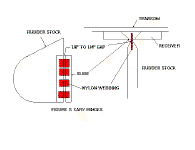
|
I ran across his review of Ted Cary's idea about using nylon seat
belt webbing in place of pintles and gudgeons. (The hardware that holds the
rudder on.) Mounting and removing the rudder should be easier.
Though it takes a little time to make, the materials cost is negligible.
Here's Jim's sketch. His write up on it is here. |
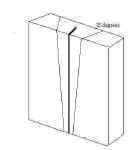
|
And here's how I decided to modify it. Ted also glued his webbing with epoxy. I'm using PL Premium (of course) |
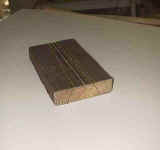 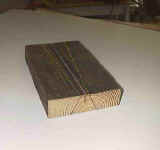 |
I started with a 10" piece of 2x6. I cut a 7/8" deep saw kerf down the center. The yellow dotted lines show how I modified the design by tapering the insert. In instrument building this trick is used to join necks to bodies. When you insert it it will snug it up against the transom. |
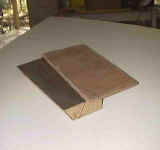 |
This could all be done with a hand saw, but I used the table saw. I don't own a taper jig. But here's an easy way to cut a taper using a scrap of plywood. I set the saw to 25 degrees and clamped the fence about 5 inches away. I ran a scrap of plywood throught the saw. |
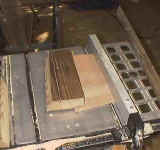
|
I then lined the cut edge of the ply up with marks I made on the BOTTOM of the wedge stock. I stapled it in place with 1/2" staples and ran in through the saw. I then pulled it off and stapled it to the other line. Works great. |
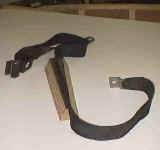
|
Here's the wedge with the seatbelt webbing trial fit in the saw kerf. |
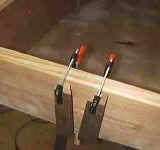 |
Here are the receivers trial clamped to the transom. |
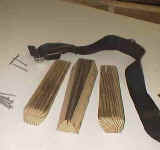
|
I shortened the receivers so the wedge is longer so I could tap it loose if it should get stuck. I've also rounded the edges and sanded them some. |
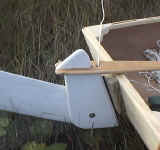
|
Here it is on the boat. It works really well. It's totally quiet and drops in securely. It requires a slight tap with an oar blade to remove it. After about a year the webbing is beginning to show signs of wear in about the top and bottom 3/8" - its getting soft, loose and shows signs of fraying. It wants to twist while in use and puts pressure in those two areas. Next I'll try hinges. |
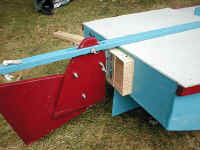
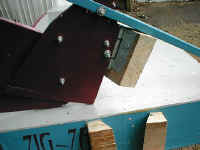 |
Hi David, I tried your combo strap/gate hinge idea, pure
genius is all I can say, the simplicity of the whole thing is just awe
inspiring...not to mention cheap! I just wanted to say thanks for
the great idea... I'm going to do the exact same setup on my D4, because it worked too well on the mouseboat. [Here are] a couple of photos for you... At the risk of being rhetorical, I can't say thanks enough. Errol Flynn I noticed that Jamestown Distributors has SS and Brass hinges for as little as a buck or two a piece. With them I think this rudder solution could be as effective and long lived as the usual set of $30 or $40 pintels and gudgeons.
|
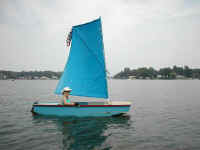 |
Here Errol's sweety learning to sail in his "Flats Rat" Mouse boat. He did a great job building her! Check out Gavin Atkin's Mouseboats forum on Yahoo and build your own! Click the mouse.. |
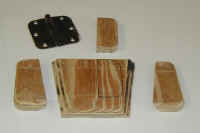
|
Well I finally
got around to trying a hinge on this alternative rudder mount.
.Here's my hinge arrangement for my Mini-Sharpie. I'm using a single butt hinge from a door. |
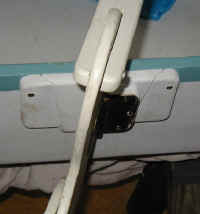
|
Notice I use a block to elevate the hinge so the rudder has full swing.. |
Main Sheet Fair lead in tiller....not entirely on topic.... but....
Back to Methods and Materials